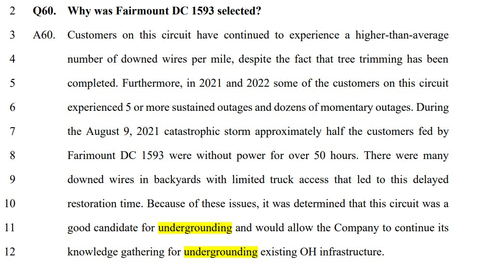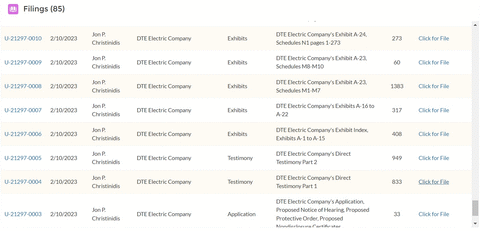DTE makes 5,170-page case for $619 million rate increase
Five takeaways from DTE Energy’s February 2023 rate case
DTE Energy is seeking a $619 million rate hike. The state-protected utility submitted a new rate case to the Michigan Public Service Commission Feb. 10 — a file that, including testimony and exhibits, came to 5,170 pages of documents.
These are five early takeaways from DTE’s Case U-21297:
1. Only 20% of the $619 million, or $124 million, would be used for operating expenses.
DTE’s sales margin, or built-in profit, is $102 million. Another $101 million will be spent on return on equity ($42 million), cost of debt and capital structure ($29 million) and other items ($30 million).
DTE’s rate base is $292 million.
According to the National Renewable Energy Laboratory, “the utility’s rate base is the total value of a utility’s assets (e.g., plant, equipment, working capital, and deductions for accumulated depreciation). Both the rate of return and the rate base are components of the utility’s revenue requirement, which the utility collects from customers in the form of electricity rates.”
2. Undergrounding pilot in Detroit will shape the future.
DTE will begin a project later in the year to put more power lines underground, on a circuit in Detroit called Fairmount DC 1593. It follows an earlier undergrounding pilot in Detroit.
The company chose the Fairmount circuit because the area it serves suffered heavy power outages, despite extensive tree-trimming.
"When this project is completed, the company will have additional data to support a more statistically significant benefit cost analysis for undergrounding projects,” wrote Satvir Deol, DTE’s director of substation operations, in his testimony in the rate case.
3. DTE still believes tree-trimming is the answer. But it can’t fill 1,300 tree-trimming jobs.
“The tree-trimming program is the most impactful and important program in (DTE’s) long-term investment strategy for its electric distribution and subtransmission systems,” wrote Shannen M. Hartwick, DTE’s director of tree-trimming, in her rate-case testimony.
But DTE struggles to find the personnel. The utility giant has been unable to find a solid, local cohort of 1,300 tree-trimmers, and sometimes has to bring in non-local talent.
Hartwick testified that locals and non-locals are all paid union wages, but non-locals are paid a per-diem to cover their lodging. Non-locals come at a greater expense.
A collaboration between DTE and the Michigan Department of Education to train prisoners in tree-trimming has only placed 23 people on the job, Hartwick testified.
4. DTE’s request, $619 million, is about 60% bigger than its last one, $388 million.
In November 2022, the Michigan Public Service Commission granted DTE only about 8% of the price hike it sought: $30.5 million. DTE wanted $388 million.
DTE returned two months later with an even bigger ask: $619 million.
When DTE filed its rate case Feb. 10, millions of Michiganders had not yet lost power in the ice storm of late February or the thundersnow of early March — or both. On Wednesday DTE will face Michigan lawmakers for the first time since the storms, when they meet with the House Energy Committee.
The public service commission will decide the rate case. But what cue will it get from lawmakers? Wednesday’s hearing and a later companion version in the Senate will be important. Michigan Attorney General Dana Nessel has also been a steady critic of the energy companies and their regular attempts at rate increases.
5. DTE’s filings from a single day ran 5,170 pages.
The Michigan Public Service Commission has only 180 employees. Large utilities like DTE Energy and Consumers Energy have the resources to submit frequent rate cases that flood the state in paperwork. The cases take about 10 months to be resolved and involve filings from the company and interveners in the case.
These interveners can be local governments, like the city of Ann Arbor, environmental groups, or energy industry groups.
Michigan Capitol Confidential is the news source produced by the Mackinac Center for Public Policy. Michigan Capitol Confidential reports with a free-market news perspective.





 Michigan energy regulator considers penalties for mass power outages
Michigan energy regulator considers penalties for mass power outages
 Michigan regulator seeks proposals for audit of DTE, Consumers
Michigan regulator seeks proposals for audit of DTE, Consumers
 DTE can’t tree trim its way to reliability
DTE can’t tree trim its way to reliability